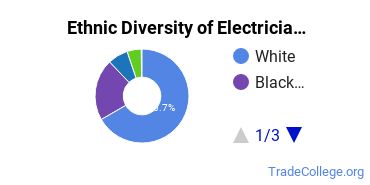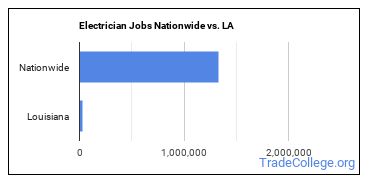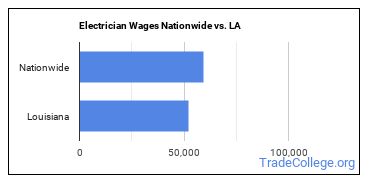Find Trade Colleges
Electrician Schools in Louisiana
733 students earned Electrician degrees in Louisiana in the 2021-2022 year.
In this state, Electrician is the 9th most popular major out of a total 119 majors commonly available.
Featured schools near , edit
Education Levels of Electrician Majors in Louisiana
Electrician majors in the state tend to have the following degree levels:
| Education Level | Number of Grads |
|---|---|
| Award Taking Less Than 1 Year | 354 |
| Award Taking 1 to 2 Years | 321 |
| Award Taking 2 to 4 Years | 321 |
| Associate Degree | 58 |
Gender Distribution
In Louisiana, a electrician major is more popular with men than with women.

Racial Distribution
The racial distribution of electrician majors in Louisiana is as follows:
- Asian: 1.4%
- Black or African American: 17.1%
- Hispanic or Latino: 4.2%
- White: 70.5%
- Non-Resident Alien: 0.7%
- Other Races: 6.1%

Jobs for Electrician Grads in Louisiana
26,780 people in the state and 1,332,680 in the nation are employed in jobs related to electrician.

Wages for Electrician Jobs in Louisiana
In this state, electrician grads earn an average of $52,200. Nationwide, they make an average of $59,190.

Most Popular Electrician Programs in LA
There are 10 colleges in Louisiana that offer electrician degrees. Learn about the most popular 10 below:
The student loan default rate is 8.90% which is lower than average. The full-time teacher rate is 62%. Grads earn an average early-career salary of $28,898 after earning their degree at this institution.
In their early career, Northshore Technical College-Sullivan Main Campus grads earn an average salary of $24,975. 24 to 1 is the student to faculty ratio. Of all the students who attend this school, 95% get financial aid.
Of all the students who attend this school, 87% get financial aid. This school boasts a lower than average student loan default rate of 6.70%. The student to faculty ratio is 25 to 1.
90% of students are awarded financial aid at this school. Roughly six years after entering college, graduates of this school earn $28,909 a year. Students enjoy a student to faculty ratio of 11 to 1.
The student to faculty ratio is 20 to 1. The 5.70% student loan default rate is lower than average. Grads earn an average early-career salary of $26,241 after earning their degree at this institution.
54% of the teachers are full time. Graduates earn an average $28,004 after graduation. 23 to 1 is the student to faculty ratio.
90% of students are awarded financial aid at this school. A typical student attending LDCC will pay a net price of $8,252. Graduates earn an average $24,465 after graduation.
Of all the students who attend this school, 94% get financial aid. The student loan default rate is 6.00% which is lower than average. In their early career, Nunez Community College grads earn an average salary of $28,811.
The full-time teacher rate is 24%. Seeking financial aid? At this school, 93% of students receive it. 14 to 1 is the student to faculty ratio.
Of all the teachers who work at the school, 55% are considered full time. 15 to 1 is the student to faculty ratio. Of all the students who attend this school, 87% get financial aid.
Electrician Careers in LA
Some of the careers electrician majors go into include:
| Job Title | LA Job Growth | LA Median Salary |
|---|---|---|
| Security and Fire Alarm Systems Installers | 17% | $42,130 |
| Electricians | 5% | $50,480 |
| Construction Trades and Extraction Worker Supervisors | 5% | $62,150 |
| Signal and Track Switch Repairers | -7% | $0 |
Related Majors in Louisiana
Below are some popular majors in the state that are similar to electrician.
| Major | Annual Graduates in LA |
|---|---|
| Electrical & Power Installation | 30 |
View all majors related to Electrician
Explore Major by State
Alabama
Arkansas
Connecticut
Florida
Idaho
Iowa
Louisiana
Massachusetts
Mississippi
Nebraska
New Jersey
North Carolina
Oklahoma
Rhode Island
Tennessee
Vermont
West Virginia
View Nationwide Electrician Report
References
- College Factual
- National Center for Education Statistics
- O*NET Online
- Image Credit: By Fran Hogan under License
More about our data sources and methodologies.

